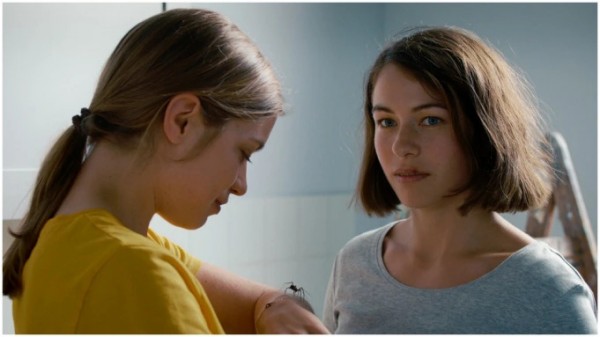-
THE GIRL AND THE SPIDER/DAS MÄDCHEN UND DIE SPINNE (Ramon, Silvan Zürcher 2021)
RAMON ZÜRCHER, SILVAN ZÜRCHER: THE GIRL AND THE SPIDER/DAS MÄDCHEN UND DIE SPINNE (2021)

HENRIETTE CONFURIIUS, LILIANE AMUAT IN THE GIRL AND THE SPIDER
Looks and portents
The Zürcher twins, Ramon and Silvan, working in tandem now as joint directors, eight years later offer with The Girl and the Spider what they declare to be "the second installment of a loose trilogy about human togetherness." The first part (where only Ramon was listed as the director) was 2013's The Strange Little Cat, and the third part will be The Sparrow in the Chimney,, which they will shoot this summer. The Girl and the Spider mostly transpires in the confines of an apartment, then another, and focuses on Lisa (Liliane Amuat), who is moving out of the flat she has shared with Mara to one of her own, leaving Mara (Henriette Confurius), who "sees herself confronted with a rollercoast of emotions." Watching the Zürchers describing this, finishing each other's sentences in true twin fashion, one can't help wondering if their interest in "human togetherness" (whatever exactly they means by that) or a "rollercoast [sic] of emotions" might be rather different from the usual ones. Or whether maybe the are sometimes more interested in moving (rather attractive) people around in confined spaces. And they are clearly not interested in delving more than very minimally into developed stories.
Many cinephiles and film festival followers nonetheless were intrigued and delighted by The Strange Little Cat, because what the Zürcher twins clearly were good at was a certain kind of deft, sometimes teasing, manipulation of small physical details within confined inhabited spaces, adults, children, animals - and now, even a moderately large arachnid, using precise cinematic means. This time, with The Girl and the Spider, they have taken a few timid steps further toward the human and the emotional, toward desire and relationships. They expand their run-time from 72 minutes to 98, and focus not just on one day in one apartment, like last time, but on two days in two apartments. It's a veritable epic! And also, as Peter Debruge puts it in his Berlinale review in Variety, they shift their focus (I would say) tentatively more toward the human, concentrating this time less on the "logistics" of Lisa's move and more on the "micro-dramas it creates."
Above all there are a lot more meaningful glances and hints of imminent or wished-for relationships or, since Lisa's departure may be a kind of break-up - vanishing ones. Looking and watching are what people are doing all through The Girl and the Spider. And those looks are fraught and fascinating. But the "micro-dramas" remain that. They never quite lead far from hints and portents or into connected narratives.
There are more defined relationships, perhaps. The new apartment is being remodeled, and there are people working on that. Lisa’s mother, Astrid (Ursina Lardi), and the contractors try to make fixes to the new apartment; Astrid and the older head contractor (André M. Hennicke) seem to want another connection. HIs son Jan (Flurin Giger) tries to chat with Mara and shows up later at a party hoping to sleep with her. Mara, who seems discontented with developments, causes minor havoc. She bothers a dog on the other side of a bathroom door, accidentally gouges a new countertop, and stabs a Styrofoam cup full of wine with a pencil and causes a big mess. Mysteriously, a downstairs neighbor leaves her crying infant to kiss Mara on the cheek and say she's sorry its not she who's moving in because she's sure they would "have fun together." A cat turns out to have been kidnapped by another neighbor at the old apartment. And then there is the herpes, which shifts from one woman's lip to the other's.
If you like speculating about these events and about the many bat-squeaks of sexuality exchanged between various men and women, this new Zürcher film, which definitely makes tentative jumps toward the human from the earlier one, will fascinate you. But be warned that the twins are great teases. Nothing goes further than a hint before the scene deftly shifts to a new incident, a new pair of people on screen. They are attractive people, particularly Liliane Amuat as Lisa, who has luminous blue eyes, and the "music-box whirl of Eugen Doga’s 'Gramophone waltz" (Debruge again), as well as the dance party that comes as a kind of climax, make events in The Girl and the Spider feel like a harmonious cinematic mini-spectacle. "The Zürchers succeed in piquing our curiosity, which is all one really needs to sustain a film," Debruge writes. Not for everyone. I watched with pleasure, yet was left feeling frustrated. But I can't say I didn't want to watch it again.
The Girl and the Spider/Das Mädchen und die Spinne, 98 min., opened in German-speaking Switzerland May 13, 2021 and showed at 36 festivals between May 2021 and Feb. 2022, including the Berlinale, Toronto, the NYFF, and the AFI. It opens Apr. 8, 2022 at Metrograph and runs there for one week.
 Posting Permissions
Posting Permissions
- You may not post new threads
- You may not post replies
- You may not post attachments
- You may not edit your posts
-
Forum Rules





 Reply With Quote
Reply With Quote
Bookmarks